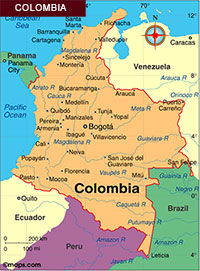Pharmacoeconomic Guidelines: Colombia
Country/Region: Colombia

PE Guidelines
PE Guidelines Source:
Instituto de Evaluación Tecnológica en Salud (IETS) (Institute of Health Technology Assessment)
Additional Information:
IETS Methods on the Participatory Process (IETS 2014)
http://www.iets.org.co/Manuales/Manuales/Manual%20Participacio%CC%81n%2030%20sep.pdf
Technical Documents for the construction of the Reference Case for Health Economic Evaluation in Colombia (IETS 2014) (in English)
http://www.iets.org.co/Manuales/Manuales/Documentos%20tecnicos%20en%20ingl%C3%A9s.pdf
Information current as of Tuesday, July 19, 2022
Key Features
| Key Features | |
|---|---|
| Type of Guidelines | PE Guidelines |
| Title and year of the document | Manual para la elaboración de evaluaciones económicas en salud (2014) Guidelines for the Development of Health Economic Evaluations |
| Affiliation of authors | Instituto de Evaluación Tecnológica en Salud (IETS) Institute of Health Technology Assessment (IETS) |
| Purpose of the document | The purpose of these guidelines is to provide guidance on the methods for the economic evaluation of health care technologies in Colombia, especially as it relates to informing coverage and financing decisions for the Colombian Obligatory Health Care Plan. It describes key principles, preferred data sources and reporting recommendations for all organizations developing an economic evaluation in Colombia. It aims to reduce variability in methods and data sources to enhance reproducibility and transparency. |
| Standard reporting format included | Yes (included on page 8-9). |
| Disclosure | Yes. |
| Target audience of funding/ author's interests | Decision makers, researchers, universities, pharmaceutical industry. |
| Perspective | The health care system perspective. |
| Indication | Only indications approved in Colombia by the relevant authority, the National Institute of Drug and Food Monitoring (INVIMA). |
| Target population | It must be clearly stated, as well as outcomes related to each relevant subgroup, if necessary. It must also be discussed with relevant stakeholders, such as methodological and clinical experts, patients and caregivers, health professionals, relevant scientific associations and others, as indicated in the "IETS Methods on the Participatory Process". |
| Subgroup analysis | Yes |
| Choice of comparator | All relevant comparators must be identified as used in common practice in Colombia. The comparators must be discussed with and justified by relevant stakeholders, such as clinical experts as well as regulatory authorities. |
| Time horizon | It must be sufficiently long to reflect all important differences in costs or outcomes between the technologies being compared (more details available on p.15). |
| Assumptions required | Yes. They must be clearly reported and explained. |
| Preferred analytical technique | Cost-Utility Analysis, (CUA). |
| Costs to be included | Direct costs for the health care system should be considered. Indirect costs and direct non-medical costs should be excluded, such as productivity and other costs assumed by patients on the base case (more details available on p.15). |
| Source of costs | Official databases and Colombian tariff manuals. If necessary, cost information can be requested from insurers and providers (more details available on p.21-23). |
| Modeling | Yes. All assumptions must be clearly stated and discussed with relevant stakeholders (more details available on p. 24). |
| Systematic review of evidences | Yes. The source for each parameter of the model must be clearly stated. |
| Preference for effectiveness over efficacy | Yes. |
| Preferred outcome measure | QALY. |
| Preferred method to derive utility | EQ-5D using tariffs from a Latin American sample of the USA valuation study. |
| Equity issues stated | The QALY has the same weight. |
| Discounting costs | Base: 5%; SA: 0 - 12% |
| Discounting outcomes | Base: 5%; SA: 0 - 12% |
| Sensitivity analysis-parameters and range | One-way sensitivity analysis for the effectiveness and unit cost of the intervention, utility weights and discount rate. Probabilistic sensitivity analysis to assess overall uncertainty. Cost-effectiveness acceptability curves and scatterplot to present results. |
| Sensitivity analysis-methods | Deterministic Sensitivity Analysis and Probabilistic Sensitivity Analysis. |
| Presenting results | Yes. Using standard reporting format is recommended (as presented on p.27). |
| Incremental analysis | Yes. |
| Total costs vs effectiveness (cost/effectiveness ratio) | No. |
| Portability of results (Generalizability) | No. |
| Financial impact analysis | It is not required for the base case analysis. If a budget impact analysis is required, there are separate guidelines, available at http://www.iets.org.co/manuales. |
| Mandatory or recommended or voluntary | Recommended. |
Acknowledgement: